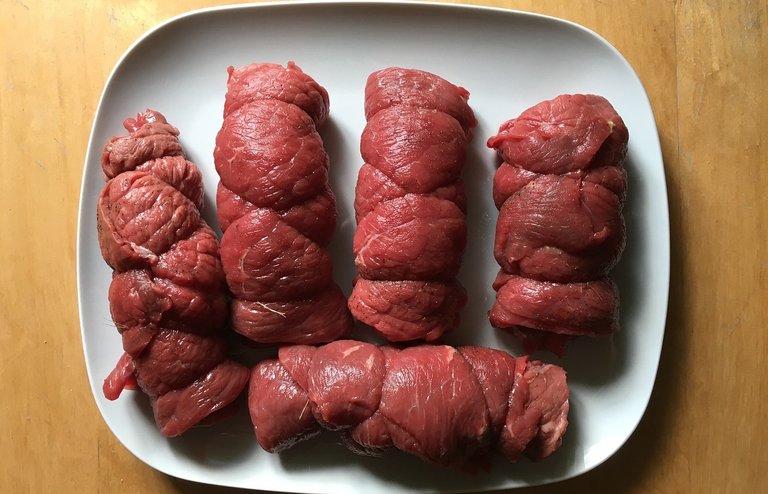Throughout history, meat has been a crucial part of the human diet, evolving from a survival necessity to a dietary staple with the discovery of fire. While meat consumption has been linked to various health benefits, it's also associated with increased risks of heart disease, certain cancers, and other health issues. This raises the question: should meat still be a fundamental part of our diet given these risks?
Eating meat is very important biologically as they provide us with energy, help acquire material to fabricate our cells, and to provide up with nutrients that our bodies cannot produce on their own. Meats are a major source of proteins, and proteins are the most important resource for repairing and replenishing our cells. Meat provides energy from fat and carbohydrate, building materials from proteins, and special molecules such as vitamins and minerals.
Meat has the amino acids our body needs, vitamins such as vitamin B12, Zinc, and so on. In all the vitamins, meat lacks vitamin C but this is available in almost all plants and it is important for our health. Since we do not produce this nutrient in our body, we need to always have this in our body and when it is missing in our body, it leads to Scurvy. Compared to plant, the nutrients in meats are broken down faster than in plant, and available quicker for absorption than plant.
While meat isn't dangerous for humans, it can have certain health effects which can vary from one animal to another and how it is prepared. Meat consumption in our world has to do with muscle tissues and these tissues do not contain all the nutrients needed by the body. If we are to look at animals based on nutrition, it is better to consume fish as it contains polyunsaturated fatty acids such as Omega-3 that supports anti-inflammatory immune response. After fish, Chicken is the next animal that can be eaten with less health effects although it contains lots of saturated fat which is associated with cardiovascular diseases.
It is normal for steak lovers to start to criticize the hypothesis that meat can have health effects but then a meta analysis studies shows that 100g consumption of meat daily increases the risk of strokes by 11%, Colorectal cancer by 17% and diabetes by 19%. Personally, I would have considered the study as effective enough but this study was a case-control study were people of different diseases were gathered and questioned about their eating habit but this study didn't consider other factors such as eating other thing like vegetables, consuming alcoholic beverages, and smoking.
When we look at processed meat, it is another case entirely as these meats are processed with different chemicals such as addition of nitrates and nitrites to hotdog which can damage the DNA of our digestive system as well as lead to other diseases such as cancer. Talking about cancer, the WHO reviewed 800 studies within the period of 20 years and came to a conclusion that eating processed meat is associated with colorectal cancer. With this when it comes to cancer association, we can say that processed meat can be placed in the same category as plutonium, asbestos, and smoking based on causation.
We could say that too much of a good thing can be bad both red meat and processed meat. While meat is an integral and beneficial part of the human diet, its consumption is not without risks. The key may lie in moderation and informed choices. Opting for healthier types of meat like fish and chicken, limiting processed meat intake, and balancing meat consumption with plant-based foods could help mitigate these risks, allowing us to enjoy the benefits of meat while minimizing its potential health hazards.
Reference
https://www.nature.com/articles/nature16990
https://geneticliteracyproject.org/2022/10/24/apex-predators-for-2-5-million-years-early-humans-stood-atop-the-food-chain-eating-mostly-meat/
https://www.nature.com/news/polopoly_fs/1.19513!/menu/main/topColumns/topLeftColumn/pdf/531139a.pdf
https://blog.oup.com/2012/01/sciwhys-why-do-we-eat-food/
https://www.encyclopedia.com/science-and-technology/biochemistry/biochemistry/amino-acid
https://www.unlockfood.ca/en/Articles/Vitamins-and-Minerals
https://www.nhs.uk/conditions/scurvy/
https://pubmed.ncbi.nlm.nih.gov/15235152/
https://www.ncbi.nlm.nih.gov/pmc/articles/PMC4171345/
https://www.heart.org/en/healthy-living/healthy-eating/eat-smart/fats/fish-and-omega-3-fatty-acids#.WokeOmaZO3I
https://www.heart.org/en/healthy-living/healthy-eating/eat-smart/nutrition-basics/meat-poultry-and-fish-picking-healthy-proteins
https://www.hsph.harvard.edu/nutritionsource/what-should-you-eat/fats-and-cholesterol/types-of-fat/


